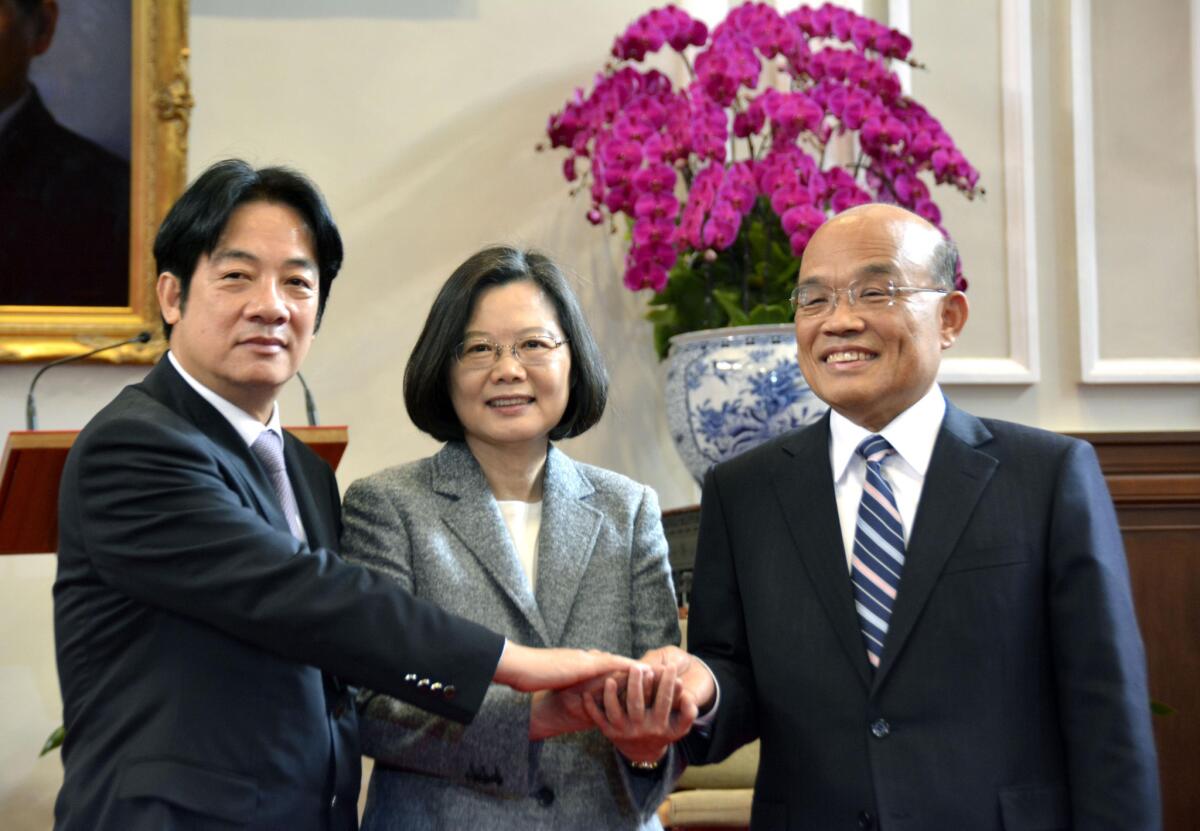Stung by election losses, Taiwan’s president replaces the premier

- Share via
Reporting from TAIPEI, Taiwan — Taiwan’s president replaced her Cabinet head Friday to atone for losses in local midterm elections seen as a mandate for the government to take stronger action on wages, economic stimulus and a sticky relationship with angry old foe China.
President Tsai Ing-wen dismissed Premier William Lai after he had served about 15 months and replaced him with former Premier Su Tseng-chang. Scholars expect the new premier to deliver visible results at least on economic issues to help the ruling party in its presidential campaign over the coming year. Its loss would probably put Taiwan’s China-leaning main opposition party back in power.
“Taiwan needs someone with the experience, will and ability to carry out follow-up reforms,” the president said at a Friday news conference.
Voters last year overturned the ruling party’s majority in Taiwan mayor and county magistrate seats, with some saying the government had done too little on core issues such as wages, economic stimulus and managing pressure from an increasingly antsy China.
“In many aspects, we reached a certain level of achievement, but on Nov. 24 last year the Democratic Progressive Party encountered an unprecedented setback,” Lai said at the news conference, referring to the ruling party. “As the nation’s highest appointed official, it’s hard to be saved from taking political responsibility.”
The Democratic party took a majority of local seats in 2014, and Tsai won the presidency two years later. But last year the main opposition Nationalist Party won 15 of the 22 local seats in the election, putting Tsai’s party in a weak position ahead of the 2020 presidential race. Tsai resigned as party chair to take blame for the poor showing.
Voters indicated in November they wanted Tsai to stand up more to Beijing, where leaders insist that the democratic, self-governed island belongs under Chinese rule, or conversely allow talks with China as the Nationalist president’s government did from 2008 to 2016. The Nationalists still embrace dialogue with Beijing.
Chinese President Xi Jinping said on Jan. 2 that China had not ruled out using force against Taiwan if needed to unify the two sides. Tsai reacted by saying that she rejects Xi’s condition for dialogue — that each side view itself as part of one China — and his idea for Hong Kong-style unification, meaning a Taiwan ruled by Beijing but with a degree of local autonomy.
China and Taiwan have been ruled separately since the Chinese civil war of the 1940s, when Chiang Kai-shek’s Nationalists lost and based their government in Taiwan.
Chinese president warns Taiwan that independence would be a disaster »
Voters further hope the government will raise wages, which average $1,510 per month, and help revitalize the economy at a time when Taiwan’s richest companies do much of their work overseas. Some expect useful infrastructure projects such as commuter rail lines and sporting arenas.
Lai’s Cabinet added money to Taiwan’s foreign currency reserves and saw exports grow, crucial for the manufacturing-reliant economy, said Michael Tsai, chairman of the Institute for Taiwan Defense and Strategic Studies, but many people didn’t notice. “The average citizen couldn’t feel any dividend, like the profit wasn’t being shared,” he said.
The new premier, a 71-year-old former lawyer, has a reputation for effectively running governments, scholars in Taiwan say. He has headed two counties and was premier in 2006 and 2007 under a different president. He is a co-founder of the ruling party and is seen as one of its four most powerful members.
“He’s someone who does what he sets out to do and does what he says,” Michael Tsai said, forecasting that Su will work on raising income levels as the president doubles down on China policy. “The public will have high expectations for him. I expect he will be more proactive and make more of a difference.”
Su is known as charismatic in public, speaking with an unusually gravelly voice, but he failed in several election campaigns. He’s also known as a tough boss. He has already started to reshuffle his staff following a mass resignation this week.
“Without a doubt, he’s the No. 1 administrator,” said Liu Yih-jiun, professor of public affairs at Fo Guang University in Taiwan. “People working under him find it difficult because he’s quite demanding.”
Jennings is a special correspondent.
More to Read
Sign up for Essential California
The most important California stories and recommendations in your inbox every morning.
You may occasionally receive promotional content from the Los Angeles Times.










